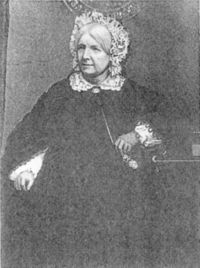Annotation:Lady Huntly's Strathspey
X:1 T:Lady Huntly's Strathspey M:C| L:1/8 C:Neil Gow Jr. (1795-1823) B:Gow - Sixth Collection of Strathspey Reels (1822) Z:AK/Fiddler's Companion K:Eb B|(G/A/B) g>f eB c2|B>Ge>G fF FA|(G/A/B) g>f eB c2|~B>c (c/B/)(A/G/) {G}BEE:|| B|{A}G>EB,E G,EB,E|B>Ge>G AFFB|{A}G>EB,E G,EB,E|B>Ge>G {G}BEEB| {A}G>EB,E G,EB,E|B>Ge>G AFF B/A/|GeBg eG BE|AB/c/ D>B GEE||
LADY HUNTLY'S STRATHSPEY. Scottish, Strathspey. E Flat Major. Standard tuning. AAB. Composed by Neil Gow Jr. (1795-1823), son of Nathaniel Gow (1763-1831) and grandson of Niel Gow (1727-1807). Neil was a member of his father's publishing business, a medical student, and a promising composer until his early demise. Nathaniel's Sixth Collection (Edinburgh, 1822) was dedicated to the Marchioness of Huntly (and her family), Elizabeth Brodie (1794-1864), wife of George Gordon (1770-1836), Marquis of Huntly and the future 5th Duke of Gordon. Elizabeth was the daughter of a wealthy merchant named Alexander Brodie and his wife, Elizabeth Wemyss, of Arnhall in Kincardinehsire. When Elizabeth and George married, at Bath in December, 1813, he was twenty-four years her senior. Elizabeth Grant of Rothiemurchas described them at the time:
Lord Huntly now in the decline of his rackety life, overwhelmed with debts, sated with pleasure, tired of fashion, the last heir male of the Gordon line. His bride was young, and good, and rich but neither clever nor handsome. She made him very happy and paid his most pressing debts, that is her father did, old Mr. Brodie of the Burn, brother to Brodie of Brodie...He made a really large fortune; he gave his daughter, his only child, £100,000 down, and left her more than another at his death. Really, to her husband her large fortune was the least part of her value: she possessed upright principles, good sense, and she turned out a first rate woman of business.

Although she may have been a good businesswoman, she was not a social person. In June 1827, George and Elizabeth became the Duke and Duchess of Gordon and took up residence in the family seat, Gordon Castle. During the nine years of her residence there were no balls given, and, as Russell (The Evangelical Movement) noted, "in Gordon Castle the world and fashion thereof were disowned by her from the first." The Duke died in 1836, and since the couple was childless, the Dukedom of Gordon became extinct.
Elizabeth retired to Huntly Lodge and devoted herself to charitable works and the church. In 1846 she joined the Free Church and subsequently, in the words of Elizabeth Grant, "got into the cant of the Methodists." She died in 1864 at Huntly Lodge and is buried with her husband in Elgin Cathedral.
